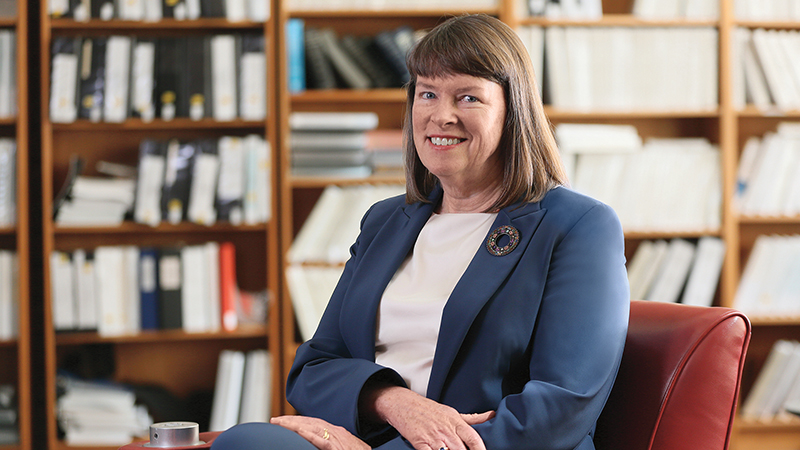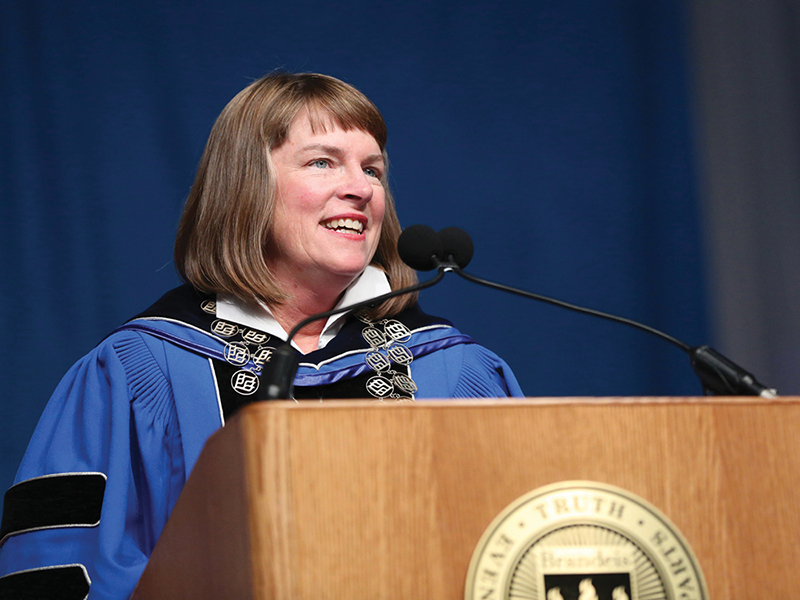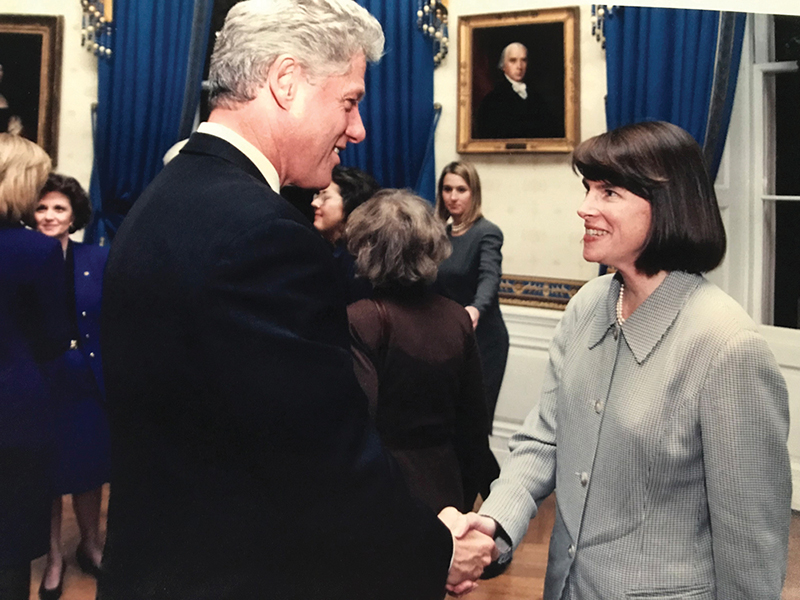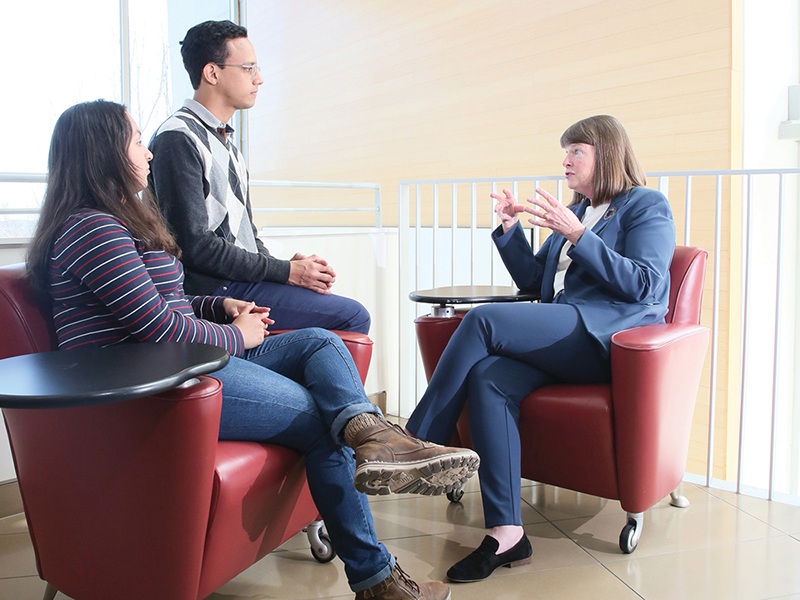
By Annie Harrison, Rabb MS’21
Photos by Mike Lovett
Throughout the COVID-19 pandemic, conflicts between economic interests and social-policy priorities have dominated national headlines, from the minimum wage, to child care tax credits, to high-profile collective-bargaining efforts.
At the Heller School, Lisa Lynch, P’17, H’17, the Maurice B. Hexter Professor of Social and Economic Policy, helps students make sense of these issues and more. By bringing her experiences in Brandeis University leadership and government, and as a scholar, into the classroom, Lynch prepares students to better understand the role of economics in shaping social policy.
Lynch, who calls herself a “data nerd,” says many students who take economics in graduate school may have avoided it as undergraduates because they found the topic too difficult or seemingly irrelevant to their course of study. She hopes students who take her classes gain a deeper understanding of how economic analysis helps inform social justice policy work.
“Economics is not the be-all and end-all of social policy, but I do think a lot of tools and empirical work done in economics can be very helpful to our students at both the master’s and PhD level,” she says.
Lynch returned to Heller in fall 2021 after serving as the Brandeis University provost and executive vice president for academic affairs from 2014 to 2015 and 2016 to 2020, and as interim president from 2015 to 2016. She previously served as dean of the Heller School from 2008 to 2014. She is also an advisory board member of the Eli J. & Phyllis N. Segal Citizen Leadership Program and Our Generation Speaks, and she recently was named director of the Institute for Economic and Racial Equity.
Last fall, after a nine-year hiatus from the classroom, Lynch taught Economic Theory and Social Policy, a required course for the Master of Public Policy (MPP) program, and a PhD seminar titled Labor Economics as Applied to Social Policy.
“I had a lot of fun trying to re-imagine and re-engineer both classes,” explains Lynch, who sourced her MPP class readings from an innovative project called CORE (Curriculum Open-access Resources in Economics). The international consortium of economists behind CORE are committed to transforming how economics is taught by making the curriculum accessible, relevant for real-world issues, and available and free to everyone.
“Too often, students are turned off from economics because the theory seems removed from the problems our students want to address — injustice, inequality, climate change and the future of work,” says Lynch. She has also included more women and BIPOC (Black, Indigenous, and people of color) scholars in the course materials than what is often found in traditional introductory economics courses. Her ultimate goal: “I want to make sure our students become fluent in the language of economics so that they can both use economics and communicate with economists.”

‘Pulling together’
Lynch is an internationally renowned labor-market economist whose early work focused on school-to-work transitions, especially for people who pursue vocational skills and training in lieu of attending college. In particular, Lynch focused on racial and gender differences in labor-market outcomes and what types of training were open and available for young people, as well as the returns on those investments. She has also studied the role of investments in organizational innovation and technology in productivity and labor-market outcomes. In this work, she examined the specific role that unions can play in raising productivity and reducing wage inequality.
“The issue of persistent and deep-seated inequality in our society was what motivated me to get into economics,” Lynch says. “Understanding the role of collective voice is important in addressing that inequality in the labor market.”
She adds that a lot of the issues of discrimination being faced today are the same issues she saw early in her career in the late 1970s and early 1980s. While there has been some progress in the past 40 years, she notes, “We deserve much more.”
In contrast to the “lean in” movement popularized in 2013 by Facebook’s Sheryl Sandberg, Lynch prefers the term “pulling together.”
Labor markets with increasing concentrations of employer power make it difficult for individual employees to stand up and push back on inequality, Lynch says. Institutions such as unions and worker advocacy groups, as well as having the ability to collectively bargain over wages and working conditions, provide opportunities for employees to pull together to advocate for their interests.
“It’s very hard for any single individual — [I’ve found this] as a scholar, as a woman who has experienced inequity in the labor market, and as an administrator working to do better — to push back against that discrimination alone,” she says. “I really believe strongly in the power of collective action.”
When it comes to supporting the collective voice of students, faculty and staff during her time as an administrator at Brandeis, Lynch points to the Draft Implementation Plan for Diversity and Inclusion at Brandeis that Ford Hall 2015 student organizers and she as interim president signed in December 2015. She believes there is a need to jointly commit to doing the work to change for the better and become a truly equitable, diverse and inclusive campus.
“As I said at the time, the agreement was the result of an enormous amount of honest discussion about our mutual goals and how to make Brandeis an even more diverse and inclusive university,” she notes. “We all acknowledged that while much work has been done, actions would need to be sustained over time by all to accomplish real change. No single person or program can change the university.”

Supporting vulnerable workers
The COVID-19 pandemic has raised unique labor-market challenges over the past two years, forcing some employers and employees to reckon with long-standing issues.
Addressing the potential for profound change in the labor market, Anthony Klotz, an associate professor of management at Texas A&M University, predicted that a large number of people would leave their jobs in 2021 due to factors related to the pandemic and heightened burnout, a phenomenon he termed the “Great Resignation.”
Lynch observes that while the term “Great Resignation” represents some workers who drop out of the labor market to care for family members and those who decide to retire because it feels unsafe to be working, for many who are quitting their jobs, it is a time to move into new employment with better wages, benefits and working conditions.
“Many American workers are finally getting a pay increase after decades of wage stagnation, poor benefits and uncertain work schedules,” she says.
Lynch notes that some journalists covering economics, such as the team at NPR’s Planet Money blog and podcast, have suggested that this moment should actually be called the “Great Renegotiation.” With more job openings, they argue, workers have greater power to negotiate a better position.
But not all workers are able to benefit from this movement, Lynch points out. In particular, workers in the home health care and child care sectors are not seeing the same large wage increases and improved working conditions as workers in other industries.
“Care-sector workers are overwhelmingly women and disproportionately Black, Hispanic and immigrants,” says Lynch. “We need to better understand and address the ways in which racism, misogyny and xenophobia shape the conditions and workforce of care provision in the U.S. if we hope to design social policies that truly support the most vulnerable in our society.”

Teaching through storytelling
In addition to her classroom teaching and academic administrative leadership, Lynch has a strong background in public service, having served as chief economist at the U.S. Department of Labor from 1995 to 1997; a member of the Governor’s Council of Economic Advisors for the Commonwealth of Massachusetts from 2008 to 2015; director (2004 to 2009) and chair of the board of directors (2007 to 2009) of the Federal Reserve Bank of Boston; and currently a member of the Economic Advisory Panel of the Federal Reserve Bank of New York. In 2022, she received a Labor and Employment Relations Association (LERA) Lifetime Achievement Award for her work advancing workplace relations.
Lynch says she often pulls from her various experiences as a policymaker and an academic, and as a senior manager in higher education, to illustrate the concepts she teaches. “I believe very strongly in the power of storytelling,” she adds.
Pierrce Holmes, MPP’22, was one of the students in Lynch’s Economic Theory and Social Policy course last fall. He says the class helped demystify economics for him, allowing him to feel more comfortable talking about economic issues, and strengthening his arguments as a policymaker.
Holmes, who is a Segal Fellow, notes that Lynch’s skill at applying economics to various topics helped appeal to students’ diverse social-policy interests and made the coursework feel practical.
“I think the things that made Lisa most effective were her ability to make concepts understandable and the way she made everything relevant,” he says. “Despite her extremely high-level work as an economist, she was able to make the theories and graphs digestible to an audience of people with little-to-no economics background. That’s one of the hallmarks of a great instructor.”
Although Holmes doesn’t consider economics a central tenet of his personal work and research, he recognizes that the economy plays a large role in many policy issues, and he is grateful the class gave him the skills to better analyze and frame his work.
“Having some of the foundational knowledge to engage in those discussions and apply the lens to my own work will help make it relevant to a broader audience,” he says. “Simply having the perspective and familiarity will make my work stronger.”
Daniella Levine, MPP’22, also took Economic Theory and Social Policy with Lynch in fall 2021. While she recognized how important it was to understand how markets influence social policy in a capitalist society, she admits she wasn’t exactly looking forward to the course at first.
“I was very much expecting the class to be mundane and hard to digest,” Levine says, “but Lisa made it very easy for me to understand and apply a lot of the theories and concepts not just to policies, but to everyday life.”
Levine grew to appreciate that the course wasn’t just focused on numbers and theoretical concepts, and that Lynch related everything back to students’ real social-policy work. Levine says this interdisciplinary approach helped change her perception of economics and how she can fit into that larger story.
Levine explains that although economics can be challenging for a lot of students, in Lynch’s class, no question felt too small or insignificant. Although Lynch has worked with prominent economists at national and international levels, she was always approachable and would take the time to stop in the hallway to chat with students.
“She’s so accomplished but so down-to-earth, and it made it really exciting to learn from someone who values every individual,” Levine remarks.
For Lynch, the adage is true: She learns as much from her students and their stories as they learn from her. She says one of her favorite things about teaching Heller students is discovering how their personal and professional experiences have shaped their social-policy interests, and their work inspires her every day, both in and out of the classroom.
“Our students are our future,” Lynch says. “I enjoy the opportunity to engage with and support our students as they acquire new tools — and to challenge them as well — so that when they leave Heller, they are able to attack these huge issues. There’s still a lot of work to be done.”
